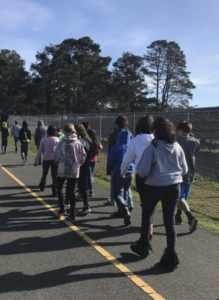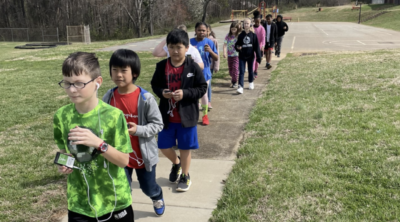Our fifth-graders say they love The Walking Classroom because they spend more time outside and they think the podcasts are interesting. I love The Walking Classroom for the same reasons, but also because the content links so beautifully with our curriculum and the Universal Design for Learning (UDL).
As part of our work to embrace the principles of UDL, we aim to present lesson content in a variety of formats, provide students options to acquire knowledge in response to their diverse learning styles, and activate or supply background knowledge. The Walking Classroom is such an excellent resource to address these needs.
In just about any unit of study in our ELA curriculum, we’ve been able to find a podcast that links to the content, and reinforces and extends students’ understanding of the topic. For instance, after close reading an article about Deborah Sampson (4-#56, Complete-#67), students head outside and learn more about her while walking and listening to a podcast.
Or, during a science unit focusing on Earth’s water supply, students listen to Marine Life (5-#76, STEM-#34, Complete-#142), Currents and Tides (5-#77, STEM-#28, Complete-#141), The Ocean Floor (5-#75, STEM-#27, Complete-#143), and the Water Cycle (4-#30, STEM-#12, Complete-#148) podcasts. The connections that are made and discussion that follows is so valuable.
At first, it was challenging for many of my students to participate in post-walk discussions because they felt overwhelmed by trying to remember everything. I found that after a first listen, it worked well to just create a class list of words, phrases or ideas they remembered from the podcast. Once the barrier was down and they had the word list to refer to, our discussions really took off.
Sarah Magee
Fifth Grade Teacher
Dana Gray Elementary





I really like your idea of creating the word lists and ideas they remembered after you walked. I also had a hard time with my fourth graders not wanting to actively participate in after walk discussions. I also tried to use the comprehension quizzes but they would just circle the answers and my students that have difficulty reading would just get discouraged. I ended up making a basic template for our discussions that they can work on together after we walk and then discuss what they remembered as a group. It has seemed to help them remember and be willing to share their ideas out after they were able to in a smaller group.